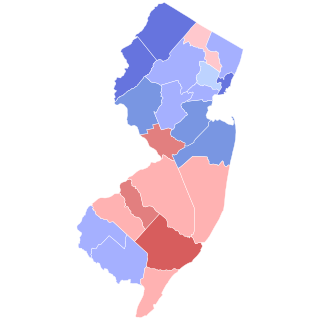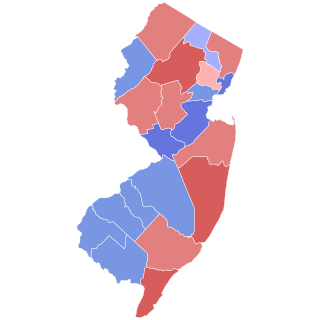
Edward Irving Edwards was an American attorney, banker, and Democratic Party politician who served as the 37th Governor of New Jersey from 1920 to 1923 and represented the state in the United States Senate from 1923 to 1929. He was a leading critic of Prohibition.

The 1988 United States Senate election in New Jersey was held on November 8, 1988. Incumbent Democratic U.S. Senator Frank Lautenberg won re-election to a second term with a margin of 8.37%. This is the last time that a Senate candidate was elected to the United States Senate in New Jersey at the same time that a presidential candidate of the opposite party won New Jersey.

The 1970 United States Senate election in New Jersey was held on November 3, 1970. Incumbent Democrat Harrison A. Williams defeated Republican nominee Nelson G. Gross with 54.02% of the vote.

The 1980 United States Senate election in Pennsylvania was held on November 4, 1980. Incumbent Republican U.S. Senator Richard Schweiker decided to retire, instead of seeking a third term.

The 1922 United States Senate special election in Pennsylvania was held on November 7, 1922. Incumbent Republican Senator George Pepper, who had been appointed to the seat by Governor William Sproul following the death of Boies Penrose, was elected to fill the remaining four years on the term to which Penrose had been elected in 1920. Pepper comfortably defeated five other candidates, including Democratic nominee Fred Kerr of Clearfield County.

The 1993 New Jersey gubernatorial election was held on November 2, 1993. Incumbent Democratic governor James Florio was narrowly defeated by Republican former Somerset County freeholder and 1990 U.S. Senate nominee Christine Todd Whitman. Primary elections were held on June 8, 1993. In the Democratic primary, Governor Florio's only challenger, anti-tax activist John Budzash, was disqualified from the ballot due to invalid petition signatures. In the Republican primary, Whitman defeated W. Cary Edwards and James Wallwork.

The 1922 New Jersey gubernatorial election was held on November 7, 1922. Democratic nominee George Sebastian Silzer defeated Republican nominee William Nelson Runyon with 52.19% of the vote.

The 1913 New Jersey gubernatorial election was held on November 4, 1913. Democratic acting Governor James Fairman Fielder, who resigned a week before the election so that he could succeed himself, defeated Republican former Governor Edward C. Stokes and Progressive former state senator Everett Colby.

The United States Senate special election of 1938 in New Jersey was held on November 8, 1938.

The United States Senate election of 1916 in New Jersey was held on November 7, 1916.

The 1918 United States Senate elections in New Jersey were held on November 7, 1918.

The 1924 United States Senate election in New Jersey was held on November 4, 1924. Incumbent Republican Senator Walter Evans Edge was re-elected to a second term in office. He would not complete the term, resigning from office in 1929 to be sworn in as the U.S. Ambassador to France.

The United States Senate election of 1928 in New Jersey was held on November 6, 1928. Incumbent Democratic Senator Edward I. Edwards ran for re-election to a second term in office, but was defeated by Hamilton Fish Kean in a landslide. This was the third of four straight elections to this seat in which the incumbents were defeated.

The United States Senate elections of 1930 in New Jersey was held on November 4, 1930.

The 1972 United States Senate election in New Jersey was held on November 7, 1972. Incumbent Republican Clifford P. Case defeated Democratic nominee Paul J. Krebs with 62.46% of the vote.
A Massachusetts general election was held on November 6, 1956, in the Commonwealth of Massachusetts.

The 1958 United States Senate election in New Jersey was held on November 4, 1958.

The 1930 Massachusetts gubernatorial election was held on November 4, 1930.

The 1991 New Jersey Senate election was held on November 5. The election took place mid-way through the term of Governor James Florio. The results were a landslide victory for the Republican Party amidst a tax revolt by New Jersey voters. Democrats picked up only one seat, that of Senator Lee B. Laskin. Republicans picked up eleven Democrat seats, winning control of the Senate for the first time since 1974. This was the first election after the 1990 census.
The 1963 New Jersey Senate elections were held on November 5.





















